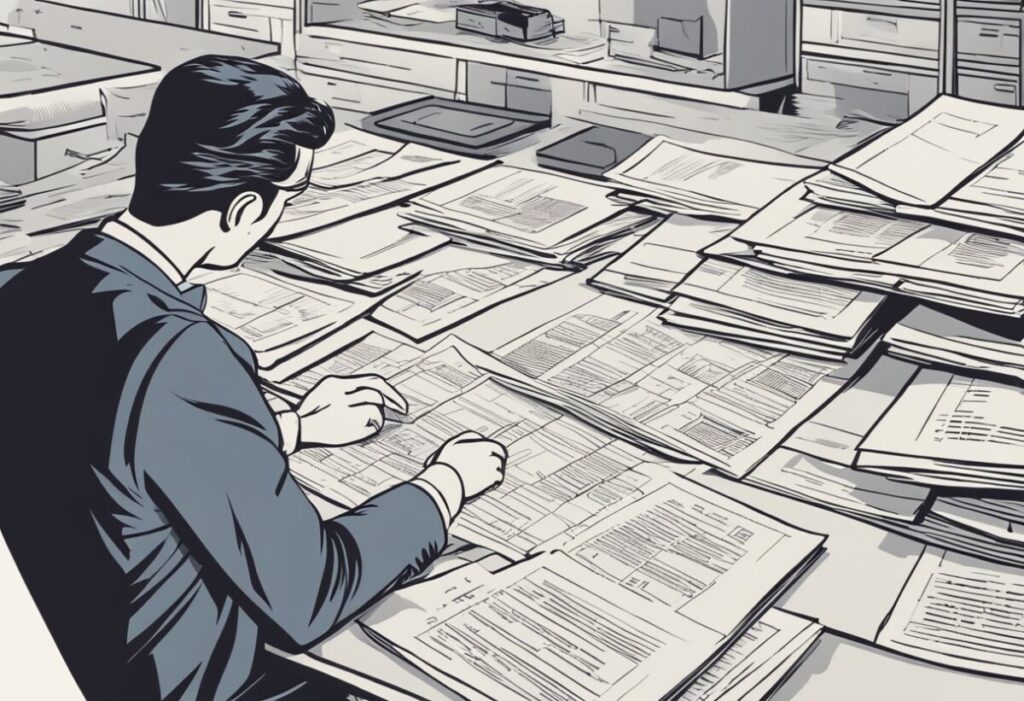Home insurance is a crucial safety net for homeowners in the event of unexpected damage or loss. However, the process of filing a claim and negotiating with the insurance company can be overwhelming and stressful. This is where a home insurance claim adjuster comes in – they are hired by the insurance company to investigate and evaluate claims on their behalf.
Table of Contents

While most claim adjusters are honest and professional, there are some who use secret tactics to minimize the payout to the homeowner. These tactics can include delaying the claims process, undervaluing damages, and pressuring the homeowner to accept a low settlement offer. Homeowners should be aware of these tactics and know their rights in order to ensure they receive fair compensation for their losses.
Understanding the Role of a Claim Adjuster
Definition and Responsibilities
A claim adjuster is a professional who works for an insurance company and is responsible for assessing and evaluating the damage caused to a property during an insured event. The adjuster’s main objective is to determine the amount of compensation that the policyholder is entitled to under the terms of their insurance policy.
The responsibilities of a claim adjuster include conducting a thorough investigation of the damage, collecting evidence, and analyzing the policy to determine the scope of coverage. They also negotiate with the policyholder and any third parties involved in the claim to reach a fair and reasonable settlement.
The Claim Process Explained
The claim process typically begins when the policyholder contacts their insurance company to report a loss. The insurance company assigns a claim adjuster to the case, who will then contact the policyholder to arrange a visit to the property.
During the visit, the adjuster will inspect the damage, take photographs, and collect any necessary information. They may also ask the policyholder to provide additional documentation, such as receipts or repair estimates.
After completing their investigation, the adjuster will analyze the information they have gathered and determine the amount of compensation that the policyholder is entitled to under the terms of their policy. They will then negotiate with the policyholder and any third parties involved in the claim to reach a settlement.
In conclusion, claim adjusters play a critical role in the insurance claim process. They are responsible for assessing the damage, analyzing the policy, and negotiating a fair settlement. By understanding the role of a claim adjuster, policyholders can better navigate the claims process and ensure that they receive the compensation they are entitled to.
Common Tactics Used by Adjusters

Initial Contact Strategies
When an insurance claim is filed, the adjuster’s first task is to contact the policyholder. Adjusters often use a friendly and empathetic tone to establish rapport with the policyholder. They may ask open-ended questions to encourage the policyholder to provide more information about the claim. However, it’s important to remember that adjusters are trained to gather information that can be used to minimize the amount of the claim payout.
Damage Assessment Techniques
Once the adjuster has established contact with the policyholder, they will likely schedule an appointment to inspect the damage. Adjusters are trained to look for evidence that could suggest that the damage was caused by something other than what the policyholder claims. They may take photographs or measurements of the damage, and may ask the policyholder to sign a release form that allows them to access medical records or other personal information.
Settlement Offer Approaches
After the damage has been assessed, the adjuster will make a settlement offer. Adjusters are trained to negotiate and may use a variety of tactics to convince the policyholder to accept a lower settlement than they may be entitled to. They may emphasize the policyholder’s financial need for a quick settlement, or may downplay the severity of the damage. It’s important for policyholders to carefully review any settlement offer and to consult with an attorney if necessary.
In conclusion, insurance claim adjusters use a variety of tactics to minimize the amount of a claim payout. Policyholders should be aware of these tactics and should carefully review any settlement offers before accepting them.
Policyholder Rights and Protections

Legal Framework Governing Claims
Home insurance policies are contracts between the policyholder and the insurance company. As such, policyholders have certain rights and protections under the law. Insurance companies are required to act in good faith and deal fairly with policyholders. They must investigate claims promptly and thoroughly, and provide a reasonable explanation if a claim is denied.
Policyholders have the right to dispute a claim denial or settlement offer. They can file a complaint with the insurance company or state insurance department. In some cases, policyholders may be able to take legal action against their insurance company if they feel their rights have been violated.
Negotiation and Dispute Resolution Options
Policyholders have several options for resolving disputes with their insurance company. They can negotiate with the insurance company directly, hire a public adjuster to represent them, or participate in mediation or arbitration.
Negotiating directly with the insurance company can be challenging, especially if the policyholder is unfamiliar with the claims process. Hiring a public adjuster can help level the playing field and ensure that the policyholder receives a fair settlement offer.
Mediation and arbitration are alternative dispute resolution options that can be less expensive and time-consuming than going to court. Mediation involves a neutral third party who helps the parties reach a mutually acceptable resolution. Arbitration involves a neutral third party who makes a binding decision on the dispute.
Policyholders should be aware of their rights and options when it comes to home insurance claims. By understanding the legal framework governing claims and negotiating and dispute resolution options, policyholders can protect their interests and ensure a fair outcome.
Preparing for the Adjustment Process

When filing a home insurance claim, it’s important to be prepared for the adjustment process. This involves gathering documentation and evidence to support your claim, as well as effectively communicating with the adjuster. By following these tips, you can increase your chances of a successful claim outcome.
Documentation and Evidence Collection
Before the adjuster arrives, it’s important to gather all relevant documentation and evidence related to your claim. This includes:
- Photos or videos of the damage
- Receipts for repairs or replacement items
- Police reports (if applicable)
- Any other relevant documents related to the claim
Organizing this information in a clear and concise manner can help the adjuster better understand the scope of the damage and speed up the claims process.
Effective Communication Tips
Effective communication with the adjuster can also help ensure a successful claim outcome. Here are some tips to keep in mind:
- Be honest and transparent about the damage and any repairs or replacement items needed.
- Ask questions if you don’t understand something the adjuster is saying or if you need clarification on any part of the claims process.
- Keep detailed notes of all conversations with the adjuster, including the date, time, and content of the conversation.
- Follow up with the adjuster regularly to ensure the claims process is moving forward.
By being prepared and communicating effectively with the adjuster, homeowners can increase their chances of a successful home insurance claim outcome.
Dealing with Lowball Offers
Recognizing Lowball Tactics
When an insurance adjuster offers a settlement that is significantly lower than what the policyholder expected, it is referred to as a “lowball offer.” Insurance adjusters may use several tactics to justify a lowball offer, such as claiming that the policyholder is at fault or that the damages are not as severe as claimed.
Policyholders should be aware of these tactics and know how to recognize them. If the adjuster is making unreasonable demands or trying to shift the blame to the policyholder, it may be a sign of a lowball offer.
Strategies for Counteroffer
If a policyholder believes that they have received a lowball offer, they should not accept it right away. Instead, they should consider negotiating for a higher settlement. Here are some strategies that may be helpful in countering a lowball offer:
- Gather evidence: Policyholders should gather as much evidence as possible to support their claim. This may include photographs, receipts, and witness statements. The more evidence they have, the stronger their case will be.
- Get a second opinion: Policyholders may want to consider getting a second opinion from another adjuster or a contractor to help establish the true value of the damages.
- Be persistent: Negotiating a fair settlement may take time. Policyholders should be persistent and not give up too easily. They should continue to communicate with the adjuster and provide additional evidence as needed.
- Consider legal action: If negotiations fail, policyholders may want to consider taking legal action. An attorney can help them understand their rights and options and may be able to negotiate a higher settlement or file a lawsuit if necessary.
Overall, policyholders should be aware of lowball tactics and know how to recognize them. By gathering evidence, getting a second opinion, being persistent, and considering legal action if necessary, they can increase their chances of receiving a fair settlement for their home insurance claim.
Maximizing Your Claim Value
When it comes to filing a home insurance claim, the ultimate goal is to receive the maximum payout possible. However, insurance adjusters are often trained to minimize payouts and save the company money. To ensure that you receive fair compensation, it’s important to understand the tactics used by insurance adjusters and how to counteract them.
Understanding Policy Coverage
One of the most important steps in maximizing your claim value is to thoroughly understand your insurance policy coverage. Insurance policies can be complex and difficult to interpret, so it’s important to review your policy and seek clarification from your insurance agent or a legal professional if necessary.
Additionally, it’s important to document all damages and losses thoroughly. Take photos and videos of the damage and keep receipts for any repairs or replacements. This documentation can help support your claim and ensure that you receive the full value of your losses.
Leveraging Professional Appraisals
Insurance adjusters often use their own appraisers to assess the value of damages and losses. However, it’s important to remember that these appraisers are working for the insurance company and may not have your best interests in mind.
To counteract this, consider hiring your own professional appraiser. A professional appraiser can provide an unbiased assessment of the damages and losses and help ensure that you receive fair compensation.
In addition, consider hiring a public adjuster. Public adjusters work on behalf of the policyholder and can help negotiate a fair settlement with the insurance company. While public adjusters charge a fee, they can often help increase the value of your claim and ensure that you receive fair compensation.
By understanding your policy coverage and leveraging professional appraisals, you can maximize your claim value and ensure that you receive fair compensation for your losses.
When to Seek Professional Help
If you have filed a home insurance claim and feel that the insurance company’s adjuster has not provided you with a fair settlement, it may be time to seek professional help. Here are two options to consider:
Hiring a Public Adjuster
A public adjuster is a licensed professional who can help you negotiate with your insurance company. They work on your behalf and can help you get a fair settlement. Public adjusters are especially useful if you have a complex claim or if you are not familiar with the claims process.
When hiring a public adjuster, it is important to do your research. Look for someone who is licensed in your state and has experience dealing with your type of claim. You should also ask for references and check online reviews before making a decision.
Consulting with an Insurance Lawyer
If you feel that your insurance company is acting in bad faith or if you have a legal dispute with them, you may want to consult with an insurance lawyer. An insurance lawyer can help you understand your rights and can represent you in court if necessary.
When choosing an insurance lawyer, it is important to find someone who is experienced in insurance law and has a good track record of success. You should also ask about their fees and make sure they are transparent about their billing practices.
Remember, seeking professional help can be expensive, so it is important to weigh the costs against the potential benefits. However, if you feel that you are not getting a fair settlement, it may be worth the investment to ensure that your rights are protected.

